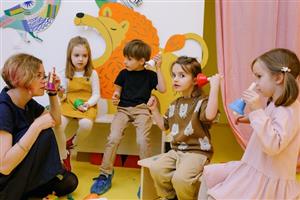- The Classical Academy
- TCA Titan's Blog
The Gift of Time: Understanding the Rationale Behind Age Requirements in Early Education
Posted by Tisha Harris on 9/15/2023
When should my child begin kindergarten or first grade? This is a question all parents ask when they start to consider enrolling their children in school. What seems like a simple question can have a somewhat nuanced answer. The Classical Academy has very specific age requirements for kindergarten and first-grade enrollment. These requirements differ a bit from the school district, so sometimes parents ask why. Here is a little about why TCA calls this practice, “the Gift of Time”.
Age Requirements for Kindergarten and 1st Grade.
The school district allows students to register for kindergarten if they turn 5 on or before October 1st. However, the Classic Academy has a different requirement that was put into place after thoughtful consideration of academic studies and years of classroom experience.
To enroll at TCA, students must turn 5 years of age on or before June 1st of the intended enrollment year in order to start kindergarten. This means if a student’s birthday is June 12, that child will start kindergarten in the enrollment year that child turns 6.
Similarly, a child must be 6 years of age on or before June 1 of the start of the school year to enroll in 1st grade.
These deadlines and age requirements are applicable to both the Traditional and the Cottage School Programs. TCA does not make exceptions to this requirement.
Why Give the Gift of Time
This was not a decision we made lightly. After careful analysis and consideration of past performance, TCA has found that younger kindergarteners, specifically those who start before or barely turning 5, tend to face more challenges throughout their academic journey. So, in order to ensure the best possible educational outcome for all students, we have established the specific age requirements for enrollment in kindergarten and 1st grade.
The Rationale for the Gift of Time
Enrollment in Kindergarten is a significant milestone in a young person's life, and it is essential to consider each child's individual readiness for this important step. Research shows that children, especially boys, are often not developmentally prepared for the academic and social demands of a classroom setting until closer to age 6.
At TCA, our kindergarten program is academically rigorous, encompassing real reading, math activities, history, science, music, art, and the beginning of writing and grammar activities. In fact, our kindergarten curriculum is comparable to what is typically taught in a first-grade classroom in other schools. Providing students with an additional year before starting formal academics facilitates a smoother transition from play to more structured learning.
The ease of transition is beneficial. Students are more confident and develop a better sense of security. This benefits them as they are introduced into the classroom community.
Moreover, studies from Stanford University have highlighted the benefits of delaying kindergarten for a year. Children who wait show lower levels of inattention and hyperactivity, leading to improved mental health that persists into later childhood, even up to age 11.
It is also worth noting that being younger than their peers can have an impact on how students are perceived as they progress through school. Physically, socially, and academically, they may continue to lag behind their classmates.
It is Important
TCA firmly believes that these age requirements will contribute to something we all want for your student: a positive and successful educational journey. By ensuring that students are developmentally ready for the challenges ahead, we can foster a supportive environment that promotes growth and achievement.
If you would like more information about our academic programs, please visit our website. If you have any questions or concerns regarding the age requirements or our school programs, please don't hesitate to reach out to us. We are here to support you and your child every step of the way.
.

